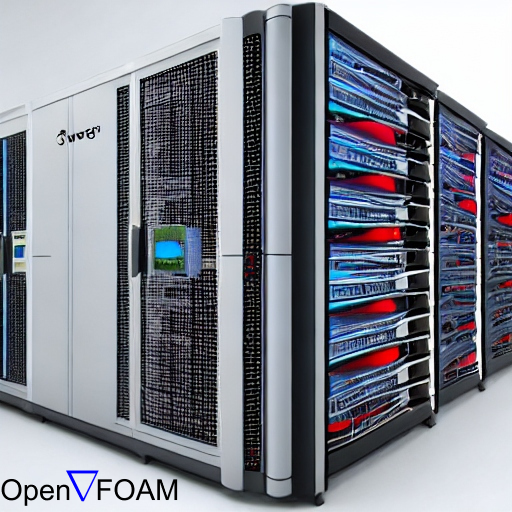OpenFOAM Parallel Performance Engineering Workshop
5 – 6 June 2023
Time TBC
Daresbury Laboratory, Keckwick Lane, WA4 4AD

OpenFOAM logo, by Carnby – Own work, Public Domain, CC BY-SA 4.0
Description and Aim
This two-day course, based at UKRI STFC’s Daresbury Laboratory in the North West of England, will be delivered through the support provided to the CCP-WSI community by the Computational Science Centre for Research Communities (CoSeC) programme. It aims to offer a practical insight into running OpenFOAM for Wave Structure Interaction (WSI) problems using MPI parallelism on large computing resources. Using OpenFOAM in parallel is relatively straight forward, however, to get the best possible performance for your problem type depends on several factors, ranging from how well a specific solver or problem can scale through to issues like domain decomposition or effective use of I/O.
Day one of this course will introduce a problem based around the interFoam solver from OpenFOAM and use a representative WSI problem to explore how to go from serial execution to a well-refined parallel approach. The learning output of this will be a deep understanding of all of the possibilities OpenFOAM offers for parallel execution and the context to know how and where to apply them in your future WSI solutions.
Day two will then move on to understanding the parallel programming model OpenFOAM provides, exploring how you can best utilise it whilst developing your own solvers. The day will then conclude with a forward-look at future solutions to further improve the parallel execution of OpenFOAM, paying attention to the areas of most importance for exascale supercomputing.
Who this course is for
Those interested in understanding how to best utilise high-performance computing resources to solve their OpenFOAM based problems and those who wish to better understand OpenFOAM’s parallel programming model and features. It is recommended that you are familiar with creating OpenFOAM cases for day one and in order to get the most from day two, are familiar with creating your own solver in OpenFOAM or are at least comfortable with programming in C++.
What you will learn
- Taking a Wave Structure Interaction type problem from a serial solution to an optimal parallel one.
- How to utilise and integrate OpenFOAM’s parallel programming model into your own solver.
- An understanding of the challenges faced by OpenFOAM as supercomputing platforms move into the exascale era and some of the solutions being proposed.
What you will need
Compute provision will be provided throughout the course, however you will need your own laptop or other mobile computing platform to access the provision. A small number of laptops will be available during the course should you not have your own, however these are limited and will be offered on a first-come-first-served basis. If you require one then please indicate during registration that this is the case.
Attendance logistics
This course is free to attend for all and refreshments plus lunch will be provided on both days, however travel and accommodation is not covered.
In order to enable access for those without funding to enable this, we are pleased to offer a small number of places (up to 5) where travel and accommodation will be covered, to ensure that this process is fair we request that if you wish to take advantage of this then please indicate this during your registration and provide a short paragraph explaining why you would like to be considered. This should include: 1) your current working situation (e.g. PhD/Postdoc); 2) an overview as to why you would like to access this funding help; 3) why this course is of interest to you.
All requests for travel and accommodation support will be considered by a panel from the CCP-WSI working group following the 1st of May 2023 and decisions will be announced by the 5th.
